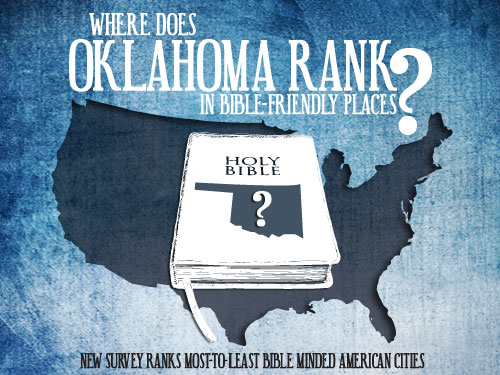New survey ranks most-to-least Bible minded American cities
Oft referred to as the buckle of the Bible belt, Oklahoma’s two major cities upheld that image according to a recent Barna Group study about how much God’s Word is read by their residents.
The state’s capital city ranked No. 15 on the list, and Tulsa came in at No. 34 among the top 96 “Bible-minded” cities in the United States.
From its place in schools, to the public square, to people’s individual lives, the current and future role of the Bible in U.S. society is an often-debated topic. The new release from Barna Group shows how this debate plays out regionally and takes a look at how 96 of the largest cities in the nation view the Bible.
The report ranks the most and least “Bible-minded” cities by looking at how people in those cities view the Bible. The study is based on 42,855 interviews conducted nationwide and the analysis of Bible trends was commissioned by American Bible Society. Individuals who report reading the Bible in a typical week and who strongly assert the Bible is accurate in the principles it teaches are considered to be Bible-minded. This definition captures action and attitude—those who both engage and esteem the Christian scriptures. The rankings thus reflect an overall openness or resistance to the Bible in the country’s largest markets.
Top Cities
Regionally, the South still qualifies as the most Bible-minded. The top ranking cities, where at least half of the population qualifies as Bible-minded, are all Southern cities. This includes the media markets for Knoxville, Tenn. (52 percent of the population are Bible-minded), Shreveport, La. (52 percent), Chattanooga, Tenn. (52 percent), Birmingham, Ala. (50 percent), and Jackson, Miss. (50 percent). Other markets in the top 10 include Springfield, Mo. (49 percent), Charlotte, N.C. (48 percent), Lynchburg, Va. (48 percent), Huntsville-Decatur, Ala. (48 percent), and Charleston, W.V. (47 percent).
Least Bible-Minded Cities
The least Bible-oriented markets include a mix of regions, but tend to be from the New England area. Easily the lowest Bible-minded scores came from Providence, R.I. (9 percent) and Albany, N.Y. (10 percent). To put this in perspective, the most Bible-minded markets are five times more likely to have residents who qualify as Bible-minded than is true in these two Northeastern cities.
Though these two cities are the most extreme, none of the cities in the bottom 10 break 20 percent, where even one in five people could be considered Bible-minded. The New England area is home to most of the markets in the bottom 10 Bible-minded cities, including Burlington, Vt. (16 percent), Portland, Maine (16 percent), Hartford, Conn. (16 percent), Boston, Mass. (16 percent), Buffalo, N.Y. (18 percent) and New York, N.Y. (18 percent).
The remaining markets in the bottom 10 are primarily in the West and include San Francisco, Calif. (16 percent), Phoenix, Ariz. (17 percent), and Las Vegas, Nev. (18 percent). Cedar Rapids, Iowa (18 percent) being something of an outlier.
Notable Patterns
Among the nation’s largest 30 cities, 10 of them are in the top half of the Bible-minded market rankings, while 20 of them are in the bottom half. Generally speaking, the more densely populated areas tend to be less Bible oriented. Only three of the most Bible-minded cities are among the largest 30 cities—Charlotte (7th), Nashville, Tenn. (14th) and Raleigh/Durham, N.C. (22nd). The other 22 top Bible-minded markets have fewer than 1 million households.
Still, among the largest markets, there are many more relatively Bible-minded cities, including Dallas / Fort Worth (27th), Atlanta (28th), Indianapolis (32nd), Houston (39th), St. Louis (41st), Cleveland (43rd) and Detroit (46th).
• Philadelphia (28 percent, rank: 52) is among the most Bible-minded cities along the eastern seaboard, ranking slightly higher than the aforementioned Northeastern cities as well as Washington, D.C. (25 percent, rank: 63) and Baltimore (26 percent, rank: 60).
• Chicago is the nation’s third largest city, and while it tends to be a bastion of many evangelical organizations, ranks between New York and Los Angeles in terms of Bible-mindedness (23 percent, rank: 76th). Colorado Springs, Colo., which is also home to many Christian organizations, is right in the middle of the pack (29 percent, rank: 51st). By comparison, Denver is ranked lower (71st) with about one in four individual’s qualifying as Bible-minded (24 percent).
In the Northwest portion of the country, the cities are all fairly similar, with about a quarter of the population being Bible-minded, including most notably Portland, Ore. (25 percent, rank: 65th and Seattle, Wash. (24 percent, rank: 69th).
Barna: Cities
This article and infographic are part of a larger initiative of Barna Group to measure and track the nation’s faith by city and by state. This report is based on 42,855 interviews conducted between 2005 and 2012. More information about the Barna: Cities effort is available here. The Bible-minded rankings have been commissioned by American Bible Society, the go-to source for all things Bible (www.americanbible.org).





